by Brian Hioe
語言:
English /// 中文
Photo credit: 顏銘緯/Facebook
New Bloom interviewed Yan Ming-wei (顏銘緯), legislative candidate for the Taiwan Statebuilding Party (TSP) in Taipei City District 8, on December 30th. Yan first became well-known for throwing a copy of Formosa Betrayed at then-president Ma Ying-jeou in 2014, then as a spokesperson for the TSP.
Brian Hioe: First, could you introduce yourself for our readers? How did you come to participate in politics?
Yan Ming-wei: I’m Yan Ming-wei. I studied sociology in college. When I was eighteen, around when I was a sophomore in high school, I began to participate in politics and came to know the TSP.
I’m twenty-three now, I’ve been participating in politics around five or six years. For most of this time, I was a spokesperson of the TSP.
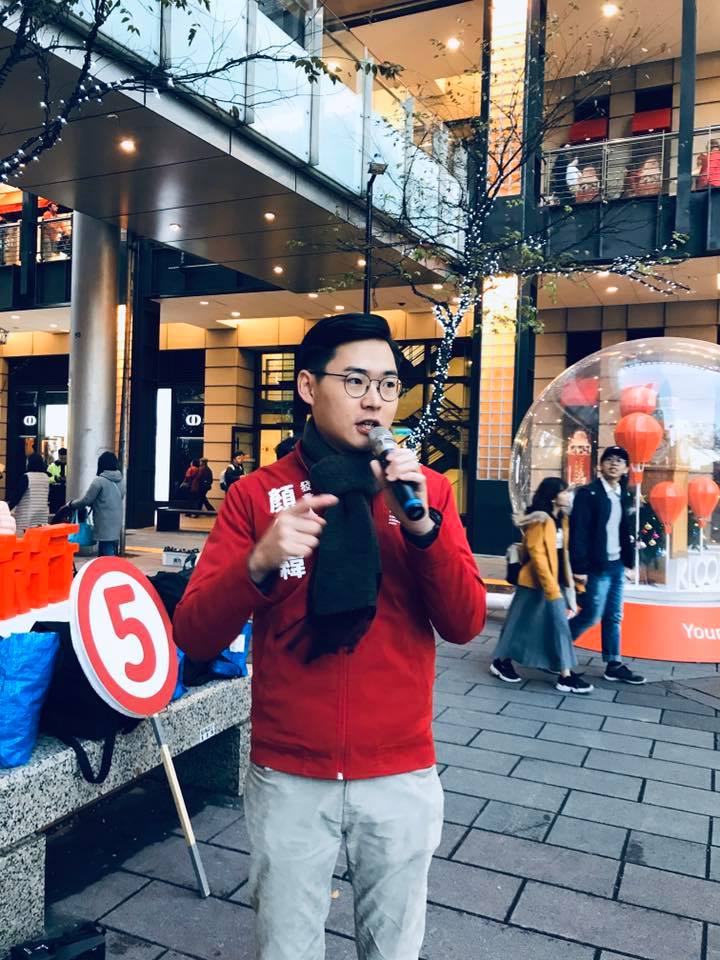 Photo credit: 顏銘緯/Facebook
Photo credit: 顏銘緯/Facebook
In the first week of college, when I was eighteen or nineteen, I threw a copy of Formosa Betrayed at Ma Ying-jeou. This may be what people know me for. But in the TSP, I worked on press releases, advertising, and policy.
BH: What led to your decision to join the TSP?
YMW: Because I’m from Kaohsiung originally, I went to high school and college in Kaohsiung. At the time, I participated in a forum run by the TSP, as a result of which I got to know some people in the party.
I decided to join the party because I believe that if you want a more pro-Taiwan or pro-independence party than the DPP, then you have to work on building that party yourself, starting from zero. This is quite difficult, though.
The young people in the TSP emphasize Taiwanese independence, transitional justice, social equality, and other issues more strongly and they are practical, they strongly emphasize action. So with regards to protests before the Sunflower Movement, such as demonstrating against Ma Ying-jeou or Taiwan Affairs Office director Zhang Zhi-jun when he visited Taiwan, and then shifting from social movements to politics, they emphasize action and organization. We’re always striving to make more people aware of us and to come in contact with more people.
BH: Why did you decide to run for office this time?
YMW: I originally didn’t plan to run. I originally planned to go to France and study abroad for a while. I decided to run because in order to run party list candidates, the TSP also needs ten district candidates.
I also hoped that in the process of running, this would allow us to share our ideals and thoughts, to communicate with people. Elections are an opportunity in Taiwanese politics to communicate ideas with voters. This is why the TSP emphasizes that we have to be on the streets, at street corners, to communicate our ideals with them. This is how we’ll have the opportunity to communicate with people outside our immediate echo chamber.
BH: What do you think is important about this year’s election, compared to previous years? To this extent, what are the issues that Taiwanese voters are focused on? Are they focused on issues regarding cross-strait relations or more domestic issues?
YMW: I feel that issues regarding Chinese infiltration or a threat from China, that China seeks to annex us, aren’t new. This started long ago.
Each election is an opportunity for international society to reevaluate us. For example, when Ma was elected, international society interpreted this as Taiwan deciding to have closer relations with China. Every four years, international society reevaluates us in this way. As a result, issues regarding China and independence/unification issues come up every four years.
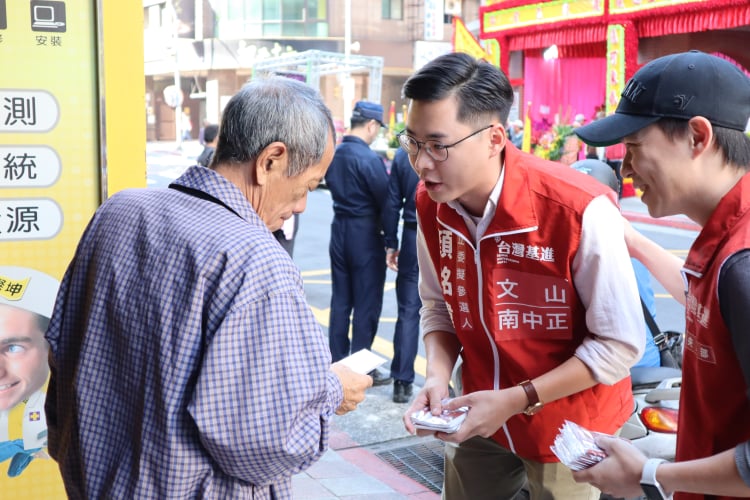 Photo credit: 顏銘緯/Facebook
Photo credit: 顏銘緯/Facebook
But this year, we see something different with the Anti-ELAB movement in Hong Kong, and the Wang Liqiang case in Australia, with growing attempts to infiltrate Taiwanese society or cultivate agents. This has put China’s threat to Taiwan’s democracy on the table, as a serious political issue. This is why everyone talks about a sense of “national doom.”
But as I said, this has to do with Taiwan’s national identity and issues of sovereignty. In truth, we have a sense of national doom every four years. You have the continued clash between the political cultures of the pro-local groups and pro-unification groups.
Pan-Green and pro-Taiwan groups emphasize that there’s a need to combat infiltration to maintain national security, to protect sovereignty in this way. We emphasize that it should be up to the nation to decide on issues of sovereignty. On the other hand, the pan-Blue camp emphasizes the economy, people’s livelihood, and this leads to a disjoint between the two camps. In the past, we’ve probably been weaker on the economy.
I think that we need to emphasize what we addressed less in the past. With the restructuring of the world economy as a result of the US-China trade war, this has benefited Taiwan, including the return of taishang, new investment. This breaks from the long-term trend in which the economy was highly dependent on China, leading our economy to be controlled by China, and our resources to be absorbed by China.
Taishang are quite acute to this. Some have shifted their resources to Southeast Asia, some back to Taiwan. I believe that this is an opportunity for economic development–one different than what the pan-Blue camp claims, calling for dependency on China.
It’s quite the contrary, the trend now is to keep distance from China, to out Taiwan back on the course of its original economic development.
So these two elements are key to us for the election. One is our political sovereignty. The other is our economic productivity and development.
BH: What do you think are the issues that voters in your electoral district are focused on? What do you think are the issues that you yourself specialize in and are particularly focused on?
YMW: My district is quite interesting. Wenshan is probably the deepest blue part of all of Taipei, apart from Xindian in New Taipei City. Members of the military, public servants, and teachers have resided here for a long time and so it is very pan-Blue. Some lizhang have gone to China to conduct exchanges.
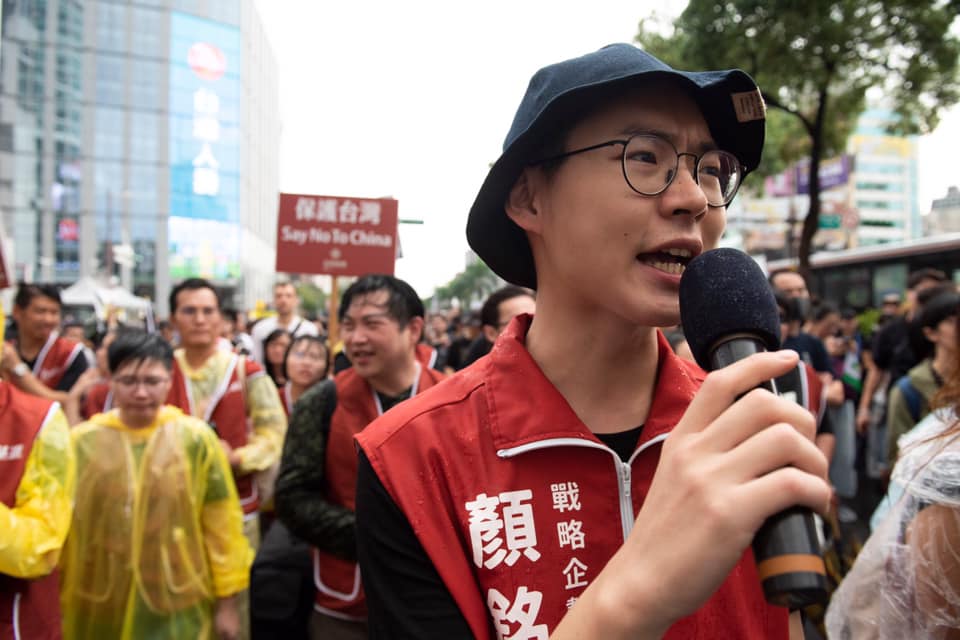 Photo credit: 顏銘緯/Facebook
Photo credit: 顏銘緯/Facebook
In an area like this, it’s very hard for us because our pro-independence position is very clear. There are people that support the 1992 Consensus and Lai Shyh-bao, who has been legislator here for twenty years, he’s the kind of legislator that…for example, when same-sex marriage was legalized, he said that if the KMT returned to power, they would repeal it. Our sense of “national doom” is due to legislators like this.
Our chances of victory are quite low in this district. We’re using elections as an opportunity to communicate with people, such as regarding over-reliance on China and the need of Taiwan to strengthen national safety and efforts to combat infiltration. We also want to emphasize economic and industrial policy to voters.
BH: The DPP is, notably, running a number of young candidates this time around and collaborating with the Radical Party, while the NPP is experiencing internal splits. What do you think this indicates about the current state of political participation in Taiwan by young people?
YMW: To put it the simplest terms, I believe that trying to follow a moderate path isn’t enough. Whether Ko Wen-je, the Taiwan People’s Party, or other moderate parties, they were reliant on media attention and political stars for their political growth and they decided to choose a moderate political path.
They claimed to be “white” and not as corrupt as both “blue” and “green”. They claimed high moral standards and that both the pan-Blue and pan-Green camps were corrupt. Just we see that this path is unviable now.
This has limits. As for the TSP, we emphasize in our policy and analysis that Taiwan doesn’t need another moderate party, because we know that Taiwan needs to seek independence, equality, and a social welfare state. It needs to local parties to compete with each other politically, like other countries in the world, whether with the Democratic and Republican parties or between other left and right countries.
Only then can society improve, rather than it is now, with a pro-Taiwan party and a pro-China party both existing in Taiwanese politics. Otherwise, you have no way of discussing policy. Like with the anti-infiltration law, The issue shouldn’t be discussing whether to pass this or not, it should be discussing the finer details of what would make it a more effective law. When it’s cold, you don’t discuss whether to wear a jacket or not, you discuss how light or heavy the jacket you should wear should be.
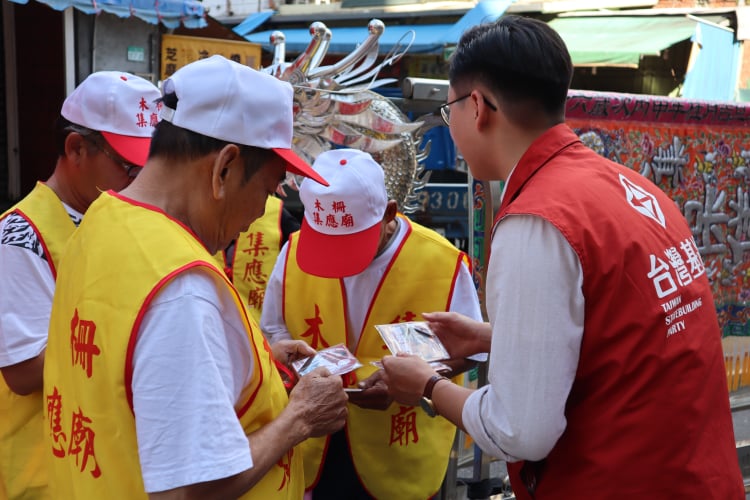 Photo credit: 顏銘緯/Facebook
Photo credit: 顏銘緯/Facebook
With a pro-China party and a pro-Taiwan party fighting with each other and then you come in, claiming a middle path but also to be above them–that they’re both equally bad–just causes people to hate politics even more. Everyone will feel disgusted by politics and there won’t be any way to discuss the important issues facing Taiwan. And among those who claim to be white, there are those with differing political values.
It’s not that you should pursue a middle path, but that you should sit next to the DPP. There needs to be a party that can be more radical, to make the DPP seem more reasonable and harmless. This way, pro-unification parties will be forced to the side and marginalized.
If it’s the DPP competing with another localized political party, then Taiwan will be able to pursue a more normal course of economic development, and Chinese forces will gradually fade away from the political spectrum. So this is why Taiwan needs a party that preserves a cooperative, but also competitive relation with the DPP.
With legislative candidates like Wu Sz-huai, it’s very clear that the KMT is still a party overly friendly toward China. Objectively speaking, the KMT is a pro-China party. It didn’t go through any process of transitional justice and so it remains our primary enemy. We cooperate with the DPP because of this shared primary enemy, but we hope to be more progressive, more local, and stronger on social policy than the DPP.
BH: Do you think that political participation by young, progressive people in Taiwan can be situated alongside international trends in politics, regarding young politicians running on progressive platforms in the US, Europe, and beyond?
YMW: I believe there are some aspects where Taiwan is similar to other parts of the world and some aspects in which Taiwan is particular. In many countries around the world, young people have been gradually deprived of what should be theirs in terms of a living environment or living standards, and they receive no return for their work. So this leads them to try to reclaim what they should have.
So this leads to generational conflict. This is a process of finding that the last generation set up the rules of the game, the current system, but that this is unfavorable to young people. This is true regarding labor conditions, raising children, social welfare policy, and etc. We find that we can’t obtain any assurances for our work. This is what has led young people across the world to protest.
What’s more particular about Taiwanese young people, as compared to other places is that we have these issues, too, regarding the living conditions faced by young people. But we face an even larger issue on top of this, which is that our democratic freedoms are being threatened and could possibly be stolen from us. The existence of our community is threatened in itself, as you also see clearly with the example of Hong Kong, and this also pushes us to protest.
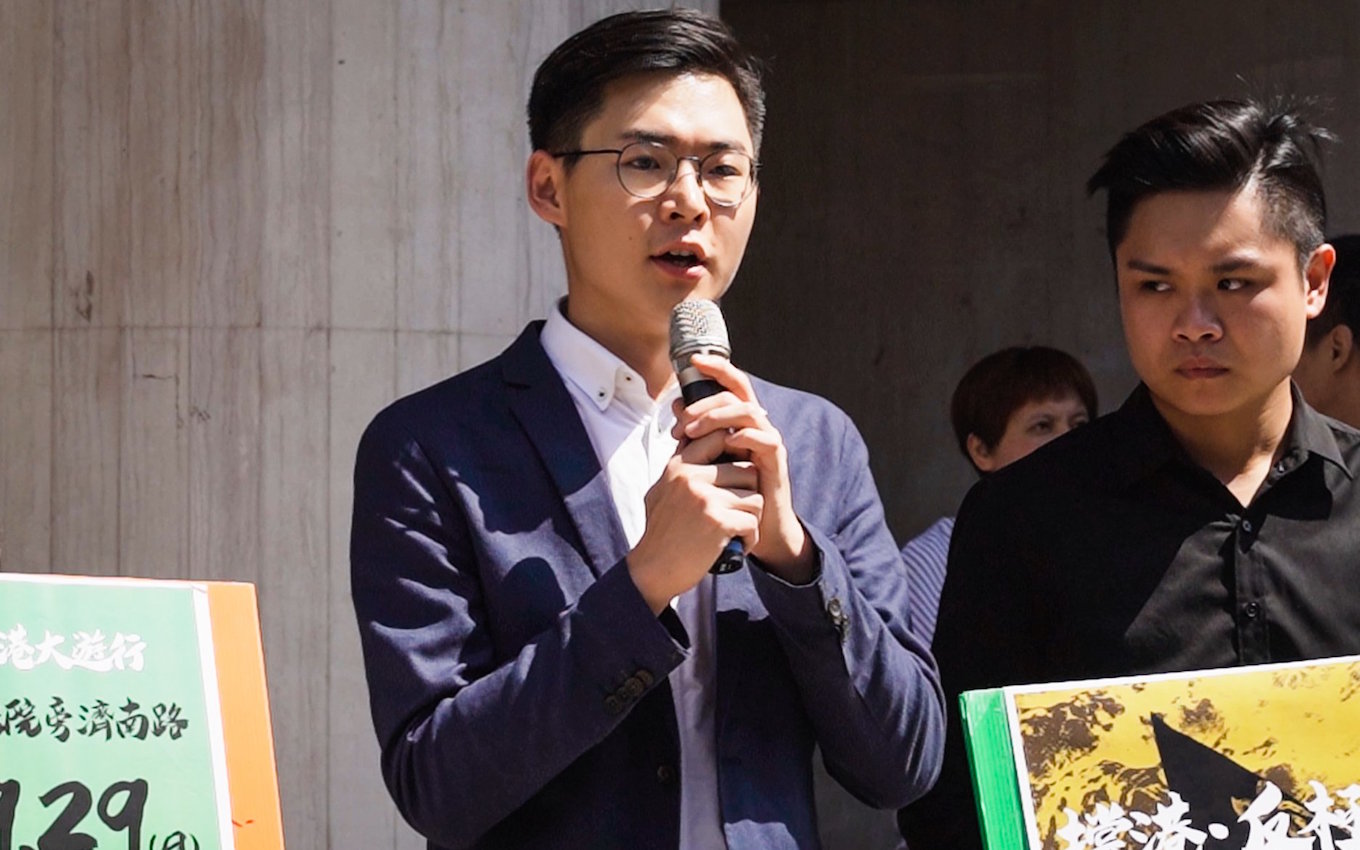 Photo credit: 顏銘緯/Facebook
Photo credit: 顏銘緯/Facebook
The international world is becoming more welcoming of Taiwan. Although the Republic of China has lost diplomatic allies, many countries have passed laws friendly to us, including America, Holland, Australia, and Japan. So situating Taiwan in international trends is not just that of young people participating in politics, but the environment has become more favorable to Taiwan.
BH: Lastly, what would you have to say to not only Taiwanese readers, but also international ones?
YMW: I believe that Taiwan is facing a historical moment. We’ve seen the rise of China as a hegemon and as an empire in the ten years from 2008 up until now, though China faces some obstacles now.
The story of Taiwan is that of a republic confronting an empire. For us, or perhaps for me individually, Taiwan has its particular history and development, but it’s hard for us to define our republic. But because of this difficulty defining what our republic is, this is an opportunity for our generation, with other generations of Taiwanese, and even non-Taiwanese friends from abroad, to define what we would like this republic to be.
This is why we’re the Taiwan Statebuilding Party. The statebuilding aspect suggests redefining the nation. But this is a very difficult process, it requires the political participation of Taiwanese, for Taiwanese to wake up, and to build consensus–which is difficult given how deeply split Taiwanese society is. I hope that friends from abroad can help us write this story together, to make this story of confronting an empire a battle between a set of values, and to create something new together. I believe this story is also currently taking place in Hong Kong.

